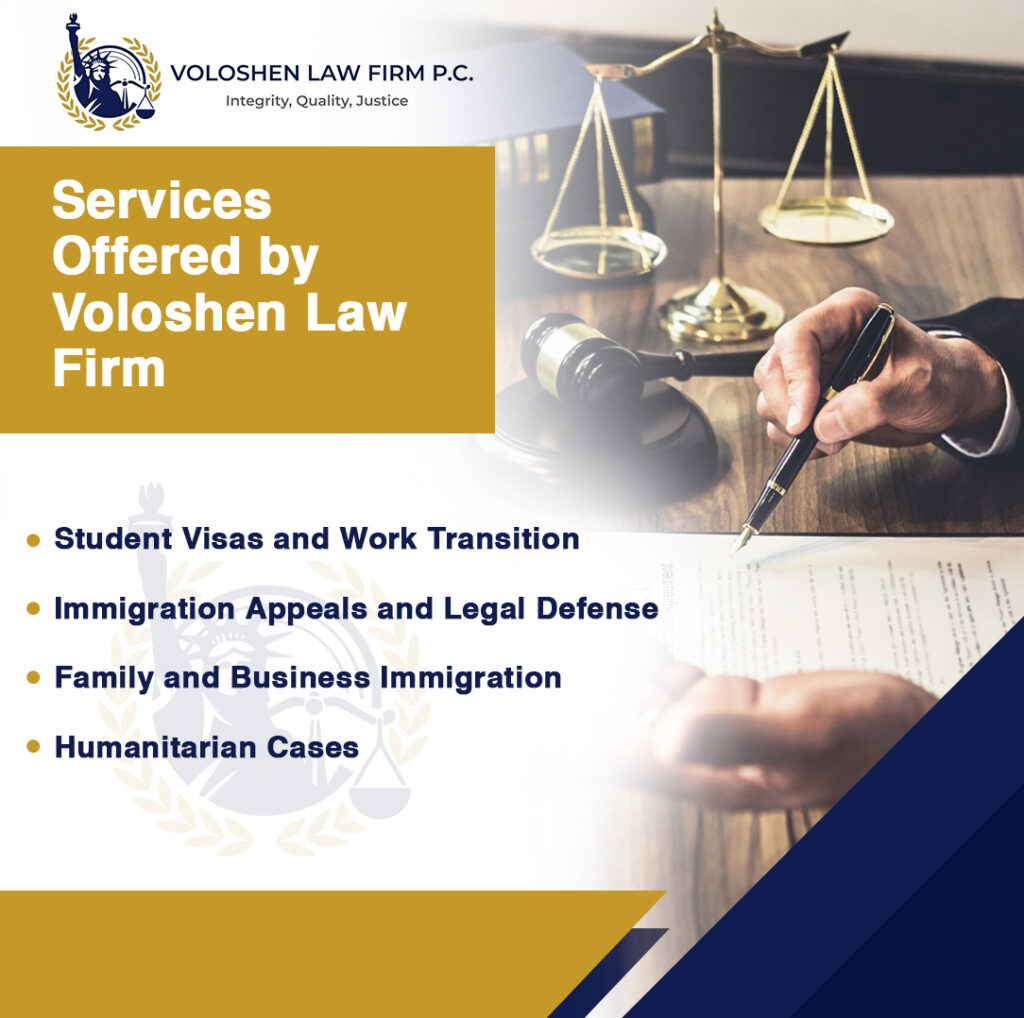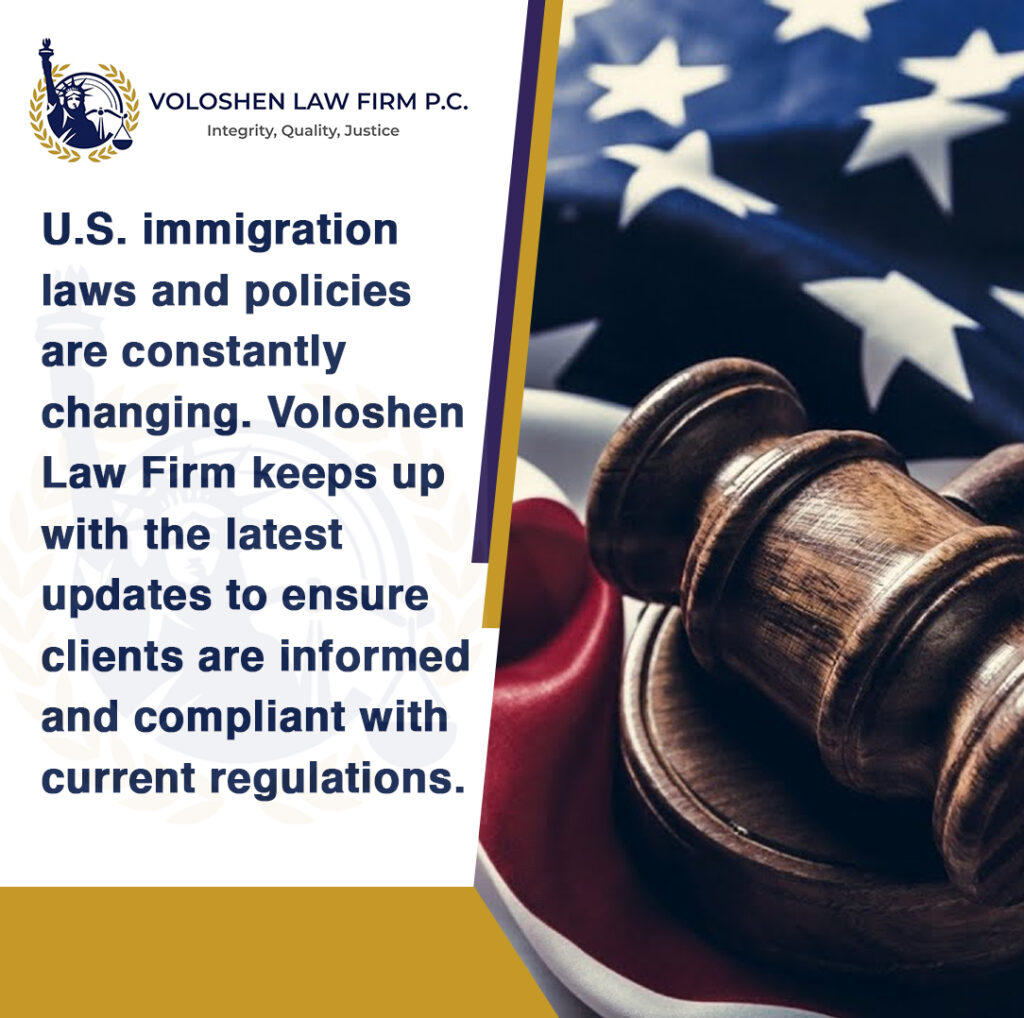Synopsis
This comprehensive guide addresses the current challenges faced by international students in the United States as immigration policies undergo significant changes. It highlights the various visa options available to students, such as the F-1 and Optional Practical Training (OPT) programs. It explores how stricter immigration policies could affect visa applications, work opportunities, family reunification, and long-term employment prospects. The article also delves into the broader consequences of tighter immigration regulations on U.S. educational institutions and employers while offering practical steps international students can take to stay compliant. Voloshen Law Firm, based in Philadelphia, plays a key role in helping students address these complexities by providing personalized legal guidance and offering remote consultations to maintain compliance with the constantly changing immigration system.
Key Takeaways
- Stricter Immigration Policies: Changes to U.S. immigration policies could lead to delays in visa processing, restrictions on work permits, and difficulties in family reunification for international students.
- Impact on Academic and Career Opportunities: Increased scrutiny on visa applications, restrictions on OPT, and challenges in transitioning to work visas like the H-1B could affect international students’ academic and career prospects, especially in fields like STEM, where OPT extensions have been crucial.
- Consequences for U.S. Institutions and Employers: Stricter policies could result in a decline in international student enrollment, diminishing cultural diversity, and financial support for U.S. colleges and universities. Employers may also face a shortage of skilled workers in key sectors.
- Staying Compliant: International students must stay informed about policy changes, consult with immigration attorneys, and prepare for potential delays or challenges in their visa applications to avoid disruptions in their studies and career plans.
- Voloshen Law Firm’s Role: The Firm offers personalized, expert legal assistance for international students, supporting them with visa applications, work permits, and compliance with U.S. immigration laws. They also provide virtual consultations for convenient access to clients across the country.
International students are vital to the U.S. economy, education system, and workforce. According to NAFSA’s latest analysis, during the 2023–2024 academic year, international students contributed $43.8 billion. They supported 378,175 jobs in the U.S. This staggering impact underscores the need for policies that support their academic and professional pursuits, yet many face increasing hurdles under stricter immigration laws.
As immigration policies continue to evolve, international students in the United States are facing increased uncertainty. Changes in visa regulations, work opportunities, and family reunification rules are particularly concerning, as these factors directly impact students’ ability to pursue their studies and live in the U.S. for the duration of their academic careers. Many international students rely on specific visa programs to study, work, and even bring their families to the country, and any tightening of these policies can pose serious challenges.
In light of these potential changes, international students must stay informed and prepared. One of the best ways to navigate these complexities is by working with experienced immigration professionals who can provide guidance, confirm compliance, and help resolve issues that may arise. Voloshen Law Firm P.C., based in Huntingdon Valley, PA, has helped countless international students manage their immigration status and legal needs, offering expert advice and services to guide them through these challenges.
Current U.S. Immigration Policies for International Students

The current immigration landscape for international students in the U.S. includes a range of visa options and policies that make it possible for students to study, work, and build careers in the country. The most common visa for international students is the F-1 visa, which allows students to attend full-time academic programs in accredited U.S. universities, colleges, and other educational institutions.
In addition to the F-1 visa, many international students also utilize the Optional Practical Training (OPT) program, which enables them to work in the U.S. for up to one year following their graduation. STEM (Science, Technology, Engineering, and Mathematics) graduates are eligible for a 24-month extension under the STEM OPT program. These opportunities provide students with the practical experience needed to enhance their careers and contribute to the U.S. workforce.
While these policies have long existed, recent developments have sparked concerns that tighter regulations could make it more difficult for international students to maintain their legal status and successfully navigate the immigration system. Changes could impact visa approval rates, limit opportunities for work authorization, or even create additional barriers for students trying to bring family members to the U.S. while studying.
For students who want to stay in the U.S. long-term, adjusting to changes in immigration policies is really important to avoid facing delays or losing access to essential programs. Understanding the current system and how policy changes may impact it is a first step in preparing for the future.
How Stricter Immigration Policies Could Affect International Students
Visa Applications and Processing Delays
One of the most immediate concerns about stricter immigration policies is the possibility of more stringent visa application procedures. In recent years, there has been an increase in the scrutiny of visa applications, with more documentation required from applicants and longer processing times for approval. If this trend continues, international students may need more time to receive their student visas, affecting their ability to travel to the U.S. in time for the start of their academic programs.
For students already in the U.S., stricter policies could result in longer wait times for visa renewals or status adjustments. This could create unnecessary stress for students, as delays could jeopardize their ability to stay enrolled, take advantage of academic opportunities, or even continue their studies. In some cases, students may find themselves unable to enter or re-enter the U.S. if their visa applications are delayed or denied, potentially interrupting their education.
Restrictions on OPT and Work Permits
The OPT program is a critical pathway for international students who wish to gain work experience in the U.S. following graduation. Under the current system, students in fields like engineering, technology, and healthcare can apply for a 12-month OPT period, with the possibility of extending this by an additional 24 months if they meet specific requirements for STEM graduates. However, proposed policy changes may tighten the criteria or reduce the availability of OPT extensions.
A reduction in the availability or length of OPT work permits would severely limit international students’ ability to gain hands-on experience in their chosen fields. Many international students rely on OPT as a stepping stone to secure long-term employment in the U.S. In addition, employers may be less inclined to hire foreign graduates if these programs become more restrictive, making it more difficult for students to gain work experience that is critical for their career development.
Moreover, any restrictions on the H-1B visa program, which international graduates frequently use to work in the U.S. long-term, could further diminish opportunities for skilled foreign workers. This would affect students who hope to transition from OPT to an H-1B visa after graduation, potentially forcing them to return to their home countries after completing their studies.
Higher Risk of Visa Denials
As the immigration system becomes more complicated, international students may face a higher risk of having their visa applications denied. Tightened eligibility requirements, increased scrutiny of applications, and more extensive background checks could all lead to more visa denials. Even minor errors or omissions in the application process could result in delays, rejections, or issues with re-entry to the U.S.
Students whose visa applications are denied may face major obstacles in pursuing their education in the U.S. They might be forced to look for alternative schools or programs, or they may not be able to return to their home countries if they have overstayed a previous visa or violated immigration laws. This situation can create serious financial and emotional strain, especially for students who have already invested substantial time and money in their studies.
Impact on Family Reunification
Stricter immigration policies could lead to additional challenges for international students who wish to bring their family members to the U.S. while they study. Family reunification through visas like the F-2 (dependents of F-1 students) could face delays or restrictions, especially in light of shifting family-based immigration policies.
This could lead to additional emotional stress for students who are already facing the challenges of studying abroad. Students may be forced to make difficult decisions about whether to remain in the U.S. without their families or return home in order to be with them. In some cases, changes to these policies could even affect the ability of students’ family members to visit them while they are studying.
Consequences for U.S. Educational Institutions and Employers
Impact on Academic Institutions
International students contribute to U.S. universities and colleges in many ways. They bring diverse perspectives and experiences to the classroom, support research efforts, enrich campus life, and contribute to the financial health of the institutions they attend. Stricter immigration policies that reduce the number of international students could have a big financial impact on schools, particularly those that rely on international tuition fees.
Fewer international students could also diminish the cultural diversity on U.S. campuses, affecting the global exchange of ideas and knowledge. Many U.S. universities have built strong reputations based in part on their ability to attract top students from around the world. Limiting the opportunities for these students could undermine the global competitiveness of U.S. higher education.
Impact on U.S. Employers
Employers in the U.S. rely on international graduates to fill skill gaps in industries such as technology, engineering, and healthcare. Stricter immigration policies that limit the number of foreign workers allowed to stay in the U.S. could create serious labor force shortages. Companies that have historically hired international graduates may be forced to look elsewhere for talent, which could stifle innovation and reduce the availability of skilled workers in key sectors.
Furthermore, many companies also depend on the OPT program to hire recent graduates and introduce them to the U.S. workforce. Changes to this program could reduce the availability of skilled foreign workers, forcing companies to adjust their hiring practices or relocate their operations abroad to access the talent they need.
Steps International Students Can Take to Stay Compliant

Stay Informed on Policy Changes
The best way for international students to stay compliant with immigration policies is to remain informed about potential changes. Immigration laws can shift quickly, and students should regularly check for updates on the U.S. Citizenship and Immigration Services (USCIS) website and other trusted sources. Being proactive and preparing for possible changes will help students avoid unnecessary complications.
Consult with Immigration Attorneys
International students facing uncertainties about their status or visa applications should seek the advice of experienced immigration lawyers. Consulting with a lawyer of immigration can provide clarity on specific policy changes, guide students through complex processes, and assist with actions such as filing an immigration appeal or addressing visa-related challenges. Voloshen Law Firm is an excellent resource for international students who need personalized assistance with their immigration needs.
Prepare for Delays or Challenges
Students should also plan for potential delays or challenges in their visa application processes. Preparing backup plans, such as adjusting travel or housing arrangements, can help alleviate stress during uncertain times. Working with an immigration attorney lawyer can help simplify the process and make sure students’ applications are thorough and accurate, minimizing the risk of delays.
How Voloshen Law Firm Can Help
Voloshen Law Firm in Philadelphia is a full-service immigration law firm dedicated to providing personalized, high-quality legal services for individuals navigating the complexities of U.S. immigration law. With a wealth of experience across various immigration tracks, the firm offers extensive services designed to address the unique needs of international students, individuals, and families in Philadelphia, seeking to navigate the U.S. immigration system.
The firm handles a wide range of immigration matters, from student visas (F-1) to family-based immigration petitions, including consular processing and adjustment of status. Whether a student is applying for an F-1 visa, seeking to extend their stay, or applying for Optional Practical Training (OPT), Voloshen Law Firm provides expert guidance to meet immigration law requirements and help secure the necessary approvals. The firm also assists with work visas, including those for business and employment-based immigration, supporting students as they transition to the workforce after graduation.
Extensive Support for Immigration Challenges
In addition to student visas, the firm handles cases involving K-1 fiancé visas, business investment visas (EB-5), and removal or deportation defense. The immigration lawyers in Voloshen Law Firm have extensive experience in areas such as inadmissibility waivers, asylum and refugee protection, immigration appeal, and cancellation of removal, helping clients overcome legal barriers to secure their ability to stay in the U.S.
Voloshen Law Firm is also known for its advocacy in humanitarian immigration matters, including representing survivors of domestic violence (VAWA), human trafficking (T Visas), and crime victims (U Visas). The firm is passionate about helping individuals in vulnerable situations seek relief through the U.S. immigration system, ensuring that their rights are protected.
The firm’s commitment to quality service extends beyond just providing legal assistance. Voloshen Law Firm is committed to offering personal attention to every client, providing quick access to experienced immigration attorneys, and delivering reasonable fees. They understand the importance of staying informed about policy changes and regulations, which is especially vital for international students.
For those seeking guidance remotely, Voloshen Law Firm in Huntingdon Valley, PA, offers virtual immigration consultations, making it easier for students and families to access their services no matter where they are located. With a deep understanding of the immigration process and a focus on client care, Voloshen Law Firm is a trusted partner for international students navigating U.S. immigration challenges.
For more information or to schedule a consultation with an experienced immigration lawyer in Philadelphia, contact Voloshen Law Firm P.C. at (215) 437-7854 or via email at igor@voloshenlaw.com.
